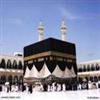
By: Hojjat al-Islam Muhsin Qara'ati
The first utterance which is obligatory for the pilgrims {hujjaj} to the House of God is the recital of labbayk the recital of which signals the commencement of their Hajj rituals and this state also makes a series of things forbidden for them.
In the same token, prayer commences with the recital of "Allahu akbar" {Allah is greater} and this makes such things as eating, drinking and talking, forbidden {haram} for the person praying. Thus, the first takbir (utterance of Allahu akbar) in prayer is called Takbirah al-Ihram.
Along the way to Mecca, the pilgrims repeat the recital of labbayk whenever they reach any upward and downward slope. This repetition is recommended or optional {mustahabb}. In every bending and standing upright, standing and sitting, it is mustahabb for the one praying to repeat the recital of Allahu akbar.
"Allahu akbar" is the first obligatory utterance in the morning.
It is the first phrase in the form of adhan and iqamah that a Muslim infant hears at the time of birth, and it is also the last phrase that is recited for the dead (in the prayer of the dead {salah al-mayyit}) before he is buried.
It is the only recital which is obligatory {wajib} in prayer as well as an essential pillar {rukn} of prayer.
It is the first sentence of the Muslim hymn, i.e. adhan.
It is the much repeated recital at the commencement of prayer, during the prayer and afterward, such that throughout the day the Muslim repeats it 360 times during the five daily obligatory prayers (not including the mustahabb prayers) as shown below:
1. For each of the five daily prayers, the adhan is recited and in every adhan, "Allahu akbar" is repeated six times (30 times in all).
2. For each of the five daily prayers, the iqamah is recited and in every iqamah, "Allahu akbar" is repeated four times (20 times in all).
3. Before the Takbirah al-Ihram in each of the five daily prayers, there are six mustahabb takbir and the seventh takbir constitutes that obligatory Takbirah al-Ihram (30 times in all).
4. The Takbirah al-Ihram at the beginning of prayers is repeated five times daily.
5. There is one takbir prior to every ruku‘ {bowing down} in the 17 rak‘ahs {cycles} of the five daily prayers (17 times in all).
6. In each of the 17 rak‘ahs of prayers we have two sujuds {prostrations} for each of which it is mustahabb to recite takbir""before and after the sujud (68 times in all).
7. Every prayer has a qunut prior to which there is a takbir (5 times in all).
8. At the end of each of the five daily prayers, there are three takbirs (15 times in all).
9. After every prayer, we recite takbir 34 times as part of the Tasbihat Hadrat Fatimah az-Zahra (‘a) (170 times in all).
Yet, what a pity that throughout our lives, we have not recited "Allahu akbar" with attention; for, if every day a person would recite "Allah is greater" with faith and perfect attention more than 360 times, he will no longer be afraid of any power, superpower or conspiracy.
To be continued ...
source : www.alimamali.com













